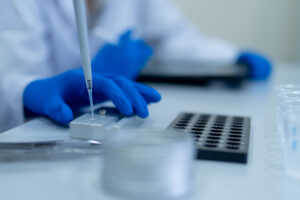For young children who may not be developing as expected, or who have delays in speech or other areas, pediatricians may now recommend genetic testing and consultation, doctors tell us in a new patient resource found in JAMA Pediatrics.
Dr. Marni Falk of the Children’s Hospital of Philadelphia in Pennsylvania, who co-wrote the information sheet, said “We want to empower families to have more information, and so much has changed about what it means to get genetic testing and what it can do.”
Pediatricians may not feel comfortable going into detail with parents about why testing may be warranted for their child, because it is a complex process with potentially far-reaching results, but Dr. Falk believes that genetic testing should be accessible, and comprehensible at an overview level, to parents as well as doctors.
The new patient resource sheet is available from JAMA at no cost here. It presents some useful practical suggestions regarding pediatric genetic testing: the risks and benefits, and some advice for kids and their parents going through the genetic testing process. It also offers a short explanation of how mutations in the chromosomes of a parent can transfer hereditary genetic disorders to a child, as well as how a spontaneous mutation may occur in a child.
Pediatric genetic testing and your child
After learning more about it, you may be wondering how genetic testing can help your child, and why a pediatrician would recommend that your child be tested.
Children may be born with disorders that affect their basic functionalities on a chronic basis, including trouble with sight, hearing, movement and balance, mood, immune system irregularities, slow or poor growth, problems with appetite, eating, and digestion, or the disorder may cause seizures, heart arrhythmias or hormonal imbalances.
By determining the gene- or chromosome-based disease that causes the problem, there may be enough information for the child’s family to look for drug trials that might not yet be generally available, or for gene-targeting therapies. There is also a very important consideration to take into account: the earlier a child receives a diagnosis, the sooner parents and caregivers can help direct the child’s health and physical, occupational, or other therapy plans, as needed, as well as incorporating that understanding into their schooling when relevant. This may greatly assist in their development, and significantly improve the child’s quality of life. Here, early intervention is key. And, in the case where a disorder, syndrome, or disease may be life-threatening, or present serious complications, of course, that is quite urgently needed information for a child’s parents or carers.
Researchers can now pinpoint up to 7,000 syndromes, diseases, and disorders caused by a mutation in just one gene. Testing for these mutations can confirm a conjectured diagnosis. A well-trained doctor may believe they recognize a condition but will refer for genetic testing and wait until testing is done. Because so many disorders share the same or related symptoms, without genetic testing, it may not be clear if it is a similar condition that could be much more severe, even fatal, or perhaps it is a very slight abnormality that may be much less of a concern. With a clear and established diagnosis, the path to treatment is open.
Is this type of testing the same as ancestry testing?
Simply put, no, it is not. The initial testing method may be similar to the trending at-home tests, or slightly altered: a cheek swab is likely to be replaced by a blood draw, but not necessarily. However, the way that the genetic material is examined, and the results that are looked for, are quite different.
In this kind of genetic testing (pediatric or otherwise), tests are ordered through a genetics specialist and may be referred by a healthcare professional. The tests scrutinize the child’s genome, looking for mutations in a set of known genes that are most often the site of abnormalities that cause problems.
In the past, only extreme and obvious cases that fit perfectly with the textbook definition of a syndrome would have been diagnosed. Today, we have more knowledge about the array of symptoms that may match up with various syndromes. Genetic testing helps us make the connection and pin down a definite disorder.
With new technology available, genetic testing processing has become a much speedier affair. This has allowed the price to drop considerably, putting it in reach of more families and individuals. Pediatric genetic testing is now also more often covered by insurance.
How genetic testing can help plan ahead for your family
Pediatric genetic testing can make all the difference for parents thinking ahead and wondering what their risks may be if they choose to have another child.
Dr. Margaret Adam of the University of Washington School of Medicine and Seattle Children’s Hospital had this to say: “Some parents say they can’t possibly have another child with complications and won’t try, even if they want more children, but instead of being scared that it may happen again, they should have accurate information about the risk for another child.”
As much as the first child may be wanted, loved, and well cared for, simply the stress and exhaustion of having a single child with serious disorders may make the parents feel that they can’t cope with a second similar child. Suppose parents find out that there is in fact a very low risk of them producing another child with the same genetic problems. In that case, that may allow them to feel more at ease about considering bringing another baby into their family.
How do I know if my child needs pediatric genetic testing?
If your healthcare provider has referred you for genetic testing, if you have a family history of certain disorders or related symptoms, or if you simply have a feeling that your child could benefit from diagnosis and treatment, it is worth looking into your options. Pediatric genetic testing may be covered by your healthcare system. If not, or if it is your choice to look into further genetic testing aside from any that has been recommended for you, there are private genetic testing options available.



